

SUBSCRIBE TO OUR FREE NEWSLETTER
Daily news & progressive opinion—funded by the people, not the corporations—delivered straight to your inbox.
5
#000000
#FFFFFF
To donate by check, phone, or other method, see our More Ways to Give page.


Daily news & progressive opinion—funded by the people, not the corporations—delivered straight to your inbox.
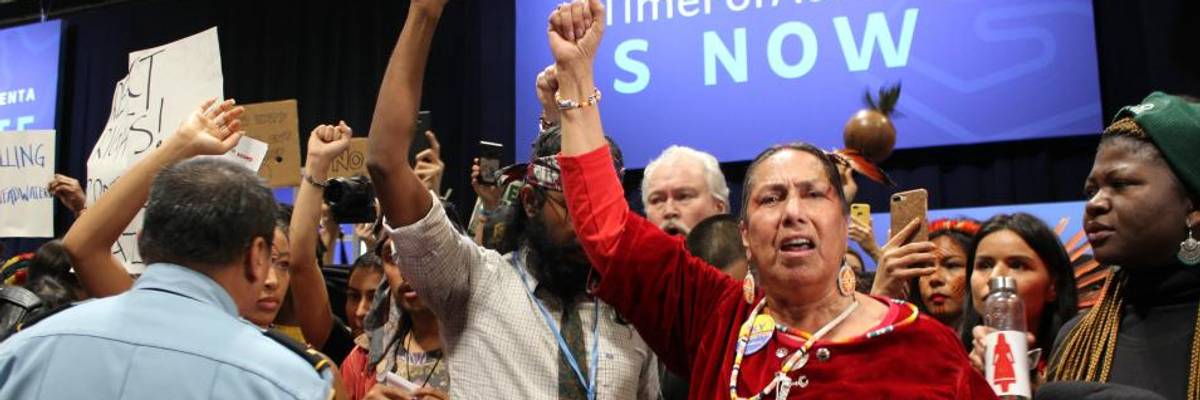
Casey Camp-Horinek, Ponca Nation leader, speaks out during an action inside the UNFCCC COP25 in Madrid. (Photo: Katherine Quaid/WECAN International)
As we celebrate the 45th anniversary of International Women's Day, it is essential to now recognize this occasion within the context of a vastly increased environmental and climate crisis. Scientists have confirmed that the pathway to staying below 1.5 degrees Celsius of warming has become urgently narrower. At the same time, many studies demonstrate that a central way to successfully advance climate solutions within this small window is to amplify the leadership and solutions of women--with keen attention to women living on the frontlines of resource extraction and climate disaster.
Women feed our world, pass on traditional ecological knowledge to next generations, and are the backbones of our communities and movements. Women are rising and leading--and importantly--getting results.
Thus, there could not be a more important time to uplift, support, and invest in women's climate justice leadership. Today is a vital moment to emphasize the power and magnitude of women and feminists globally who are speaking out and working ceaselessly to build solutions that protect, defend, and restore the Earth and our communities.
It is also a time to be reminded that due to unequal gender norms, women are impacted first and worst by environmental degradation and climate chaos. Women and children are 14 times more likely than men to die during a disaster, make up 80 percent of climate refugees, and experience sharp increases in sexual violence, human trafficking, and other gender-based abuses when extractive industries overtake and operate in their communities. Globally, women are responsible for over half of the world's household food production, which also means that when natural disasters strike women have to work longer and travel further to produce food and water for their families and communities.
Yet, in the midst of multi-layered injustices including institutionalized patriarchy, colonization, racism, and economic inequality, women continually lead the way from forest protection to transformative and bold climate policies, from water and food programs to resistance efforts against extractive industries. Women feed our world, pass on traditional ecological knowledge to next generations, and are the backbones of our communities and movements. Women are rising and leading--and importantly--getting results.
2020 is the beginning of a new era, one in which we must determine an immediate path forward to radically address climate change. Already this year we can see how decades of organizing are coming to a head, reminding us what we must fight for in the face of humanity's greatest socio-ecological crisis. We have been brought to this moment in great part due to women-led, youth-led, BIPOC-led organizations and groups who have been engaged in this work for decades and generations, who have offered a roadmap for effective strategies, climate justice policies, non-violent civil disobedience, mass mobilizations, and more. The time is now to put all that has been learned into action, to utilize every skill and tactic to fully address the climate crisis and amplify community-led solutions.
On March 8th, the Women's Earth and Climate Action Network (WECAN) International is honoring the roots of International Women's Day, which is founded on the courage of powerful women and feminists leading revolutions that ensure our rights are upheld, our lands are protected, and our bodies are respected. Women across diverse sectors are collectively calling for climate justice and a feminist response to the climate crisis. On this International Women's Day, WECAN is showcasing the breadth, depth, and strength of women's climate leadership by highlighting outstanding women around the world who are working at the local, national, and international levels to take climate action. Some are well-known, while others are not, yet, each of these women leaders are an example of the millions of women who are leading and acting with fierce dedication to accelerate a global women's movement for the protection and defense of the Earth's diverse ecosystems and our communities.
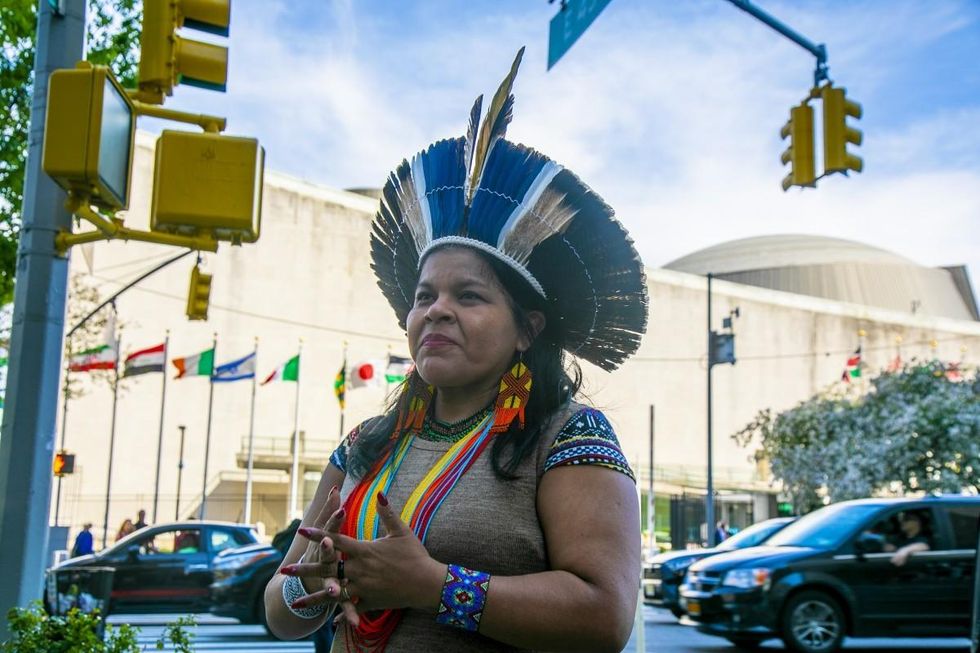
"Everyone has to play a role to guarantee the lives of the people and protect the environment. Indigenous lands are still the most preserved areas and they contain 80 percent of all the biodiversity that exists, and this protection is guaranteed by our own ways of life. So, if the Indigenous peoples are threatened, all humanity is threatened. If biodiversity is threatened by the politicians regarding mining, agro-business, all humanity is threatened. So we call all the people all over the world, Indigenous, non-Indigenous, children, youth and women to join us in the resistance to denounce all the threats that are happening in Brazil. This fight is not just ours, we cannot handle this responsibility by ourselves. We are all called to be at the frontlines of the resistance."
Sonia Bone Guajajara is the executive coordinator of the Articulation of Indigenous Peoples of Brazil (APIB). She is an Indigenous leader from the Arariboia Indigenous Land of the Guajajara people and was a candidate for vice president of Brazil in the 2018 elections. In 2020, Guajajara will lead an Indigenous women's caravan in Brazil that will support the leadership of Indigenous women throughout the Amazon.
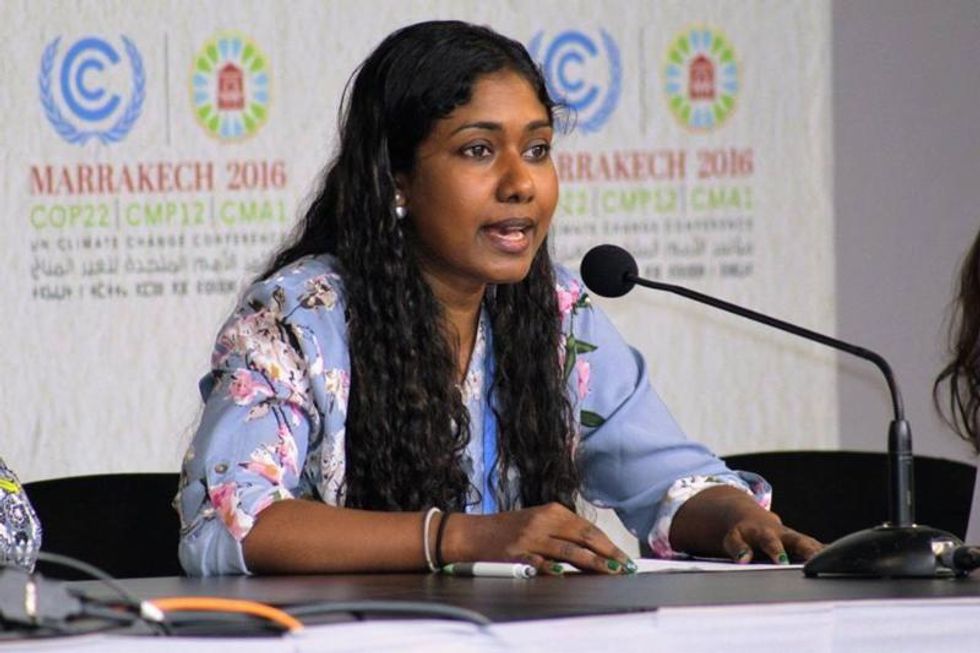
"We are seeing because of climate change 200 to 500 thousand people dying every year. We are living this climate genocide, and we cannot pretend that this is not happening. We have to call it for what it is--it is a climate genocide, and this genocide is fueled by corporate greed and funded by the fossil fuel industry, an industry that has crippled our governments with their money and eradicated our democracies. ...But we are not going to sit by... you are not going to gamble with the lives of our children--we will fight back and we are fighting back, we will do everything we can. Our children will not be climate refugees."
Thilmeeza Hussain is the permanent representative of Maldives to the United Nations and is co-founder of Voice of Women, a Maldivian organization working on issues of women's empowerment, human rights, and climate change.
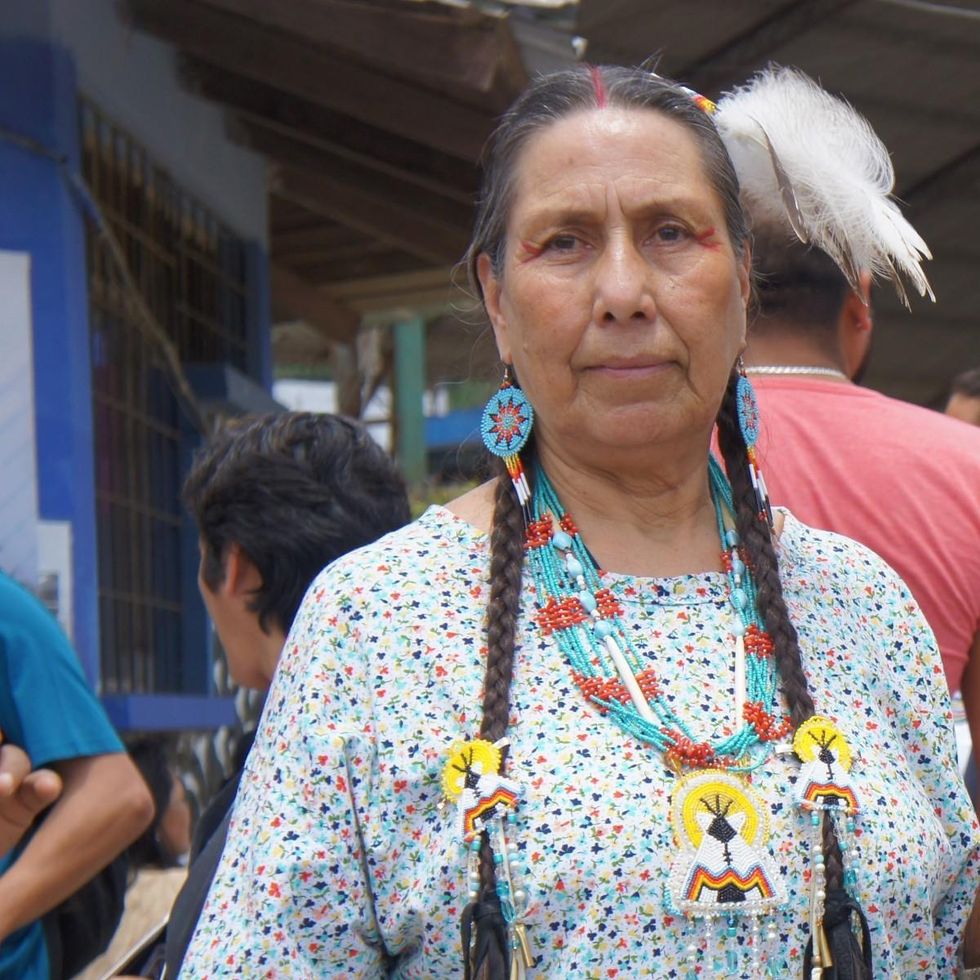
"We are not here to save nature, we are nature saving itself... We belong to the Earth, she does not belong to us. To enslave her is so ugly, to rape her is the same as violence against us because it is violence against us. If we continue along this path of unravelling the web of life and carelessly burning it in fossil fuels, we will be another species to disappear. What will your legacy be?"
Casey Camp-Horinek of the Ponca Nation is a community leader, longtime Native rights activist, environmentalist, actress, and WECAN International senior advisor. As traditional drumkeeper for the Ponca Pa-tha-ta, Woman's Scalp Dance Society, Camp-Horinek helps maintain the cultural identity of the Ponca Nation of Oklahoma for herself, her family, and her community.
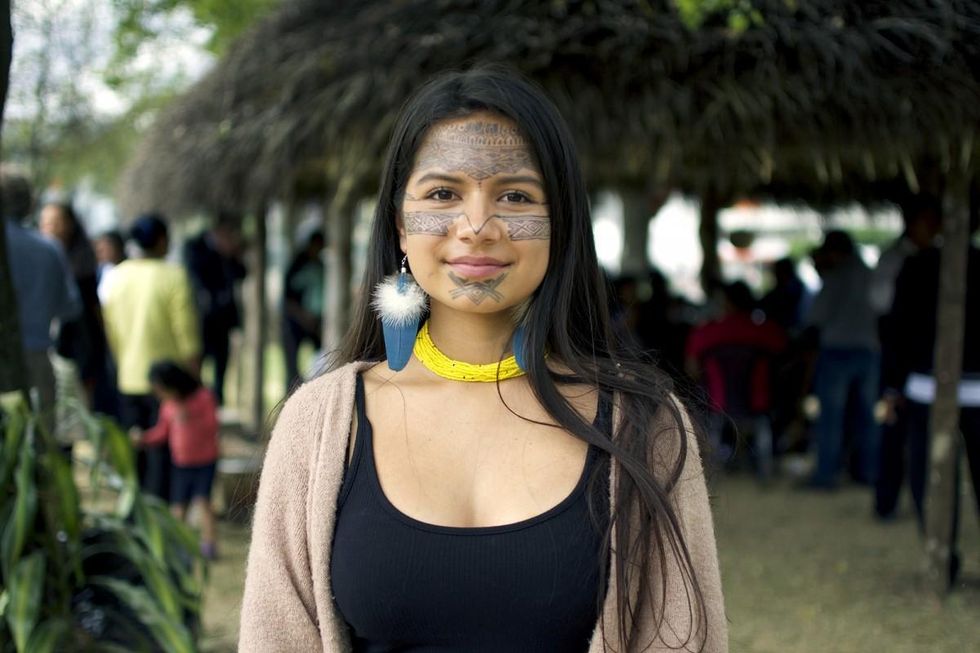
"We have been protecting the world's biodiversity for hundreds of years and we will keep doing that and we are not going to stop; we are not going anywhere. We are going to be here, even if the governments are trying to cover up their criminal activity in our territories... I am here to demand that the oil is kept in the ground [and] we have the human rights we deserve."
Helena Siren Gualinga is an 18-year-old social activist, of Kichwa-Indigenous and Swedish origin. She is known for her advocacy for climate and environmental justice. In 2020, Gualinga is spearheading a campaign called 'Polluters Out' to address the influence of the fossil fuel industry in governments and the United Nations.
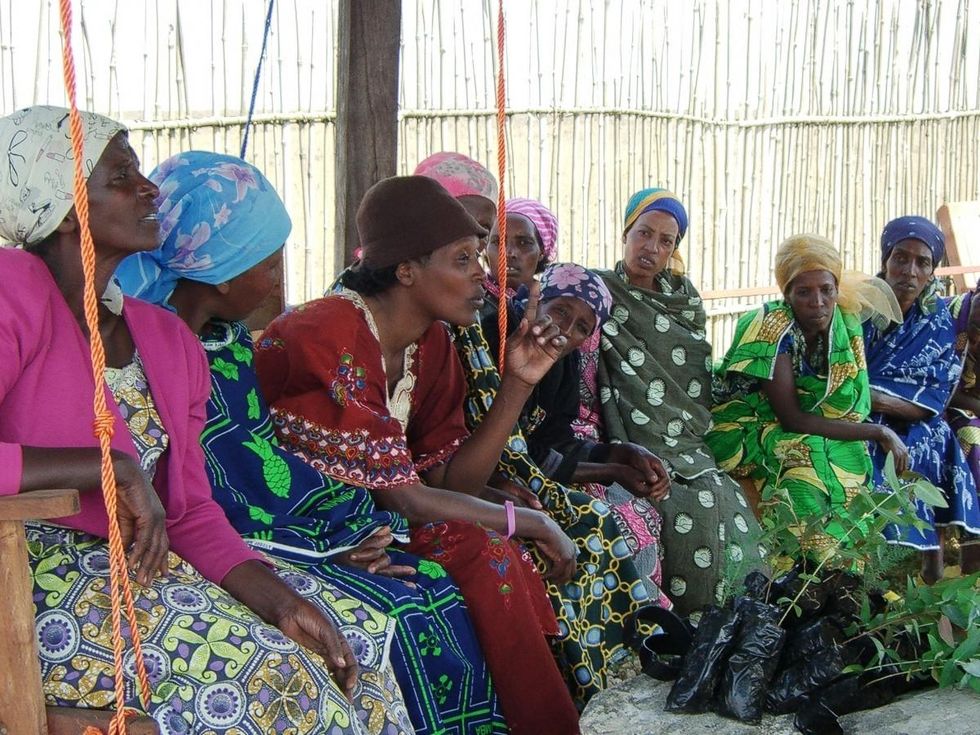
"The women of Congo are determined to change things in Itombwe, for ourselves and for the rest of the world. We are taking our forest stewardship seriously. We know that the difference we make not only affects our world, but the rest of our planet. We feel the weight of it all and are doing our part. To our sisters around the world we say: We are together!"
Neema Namadamu is a visionary peacemaker from Bukavu, South Kivu Province in Eastern Democratic Republic of Congo (DRC). Namadamu is founder and director of SAFECO and WECAN International regional coordinator in the DRC where she works to build women's leadership and protect the rich ecosystems of the Itombwe rainforest.
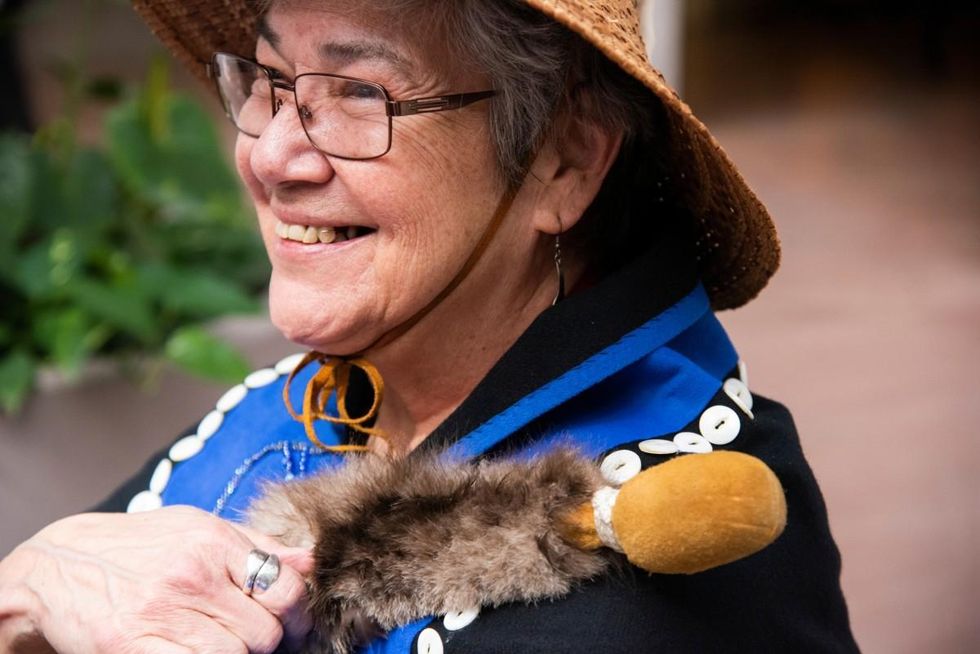
"It has been on the shoulders of Indigenous women to bring our voices forward because we are the ones, as Mother Nature is, who brings life forward, we are the ones who also feel protective towards life, especially for our children and grandchildren into the future and the world that we are leaving behind for them, all of this matters, we are not just here for nothing...We've got to have our voices heard to make a statement and save the Tongass by codifying the 2001 National Roadless Rule into law."
Kashudoha Wanda Culp is an Indigenous Tlingit activist, advocate, and hunter, fisher and gatherer of wild foods, born and raised in Juneau, and living in Hoonah, Alaska. She is the WECAN International Tongass Regional Coordinator and is spearheading initiatives to protect the Tongass rainforest from clear-cut logging and deforestation, and to uplift the traditional rights and lifeways of the regions Indigenous peoples.
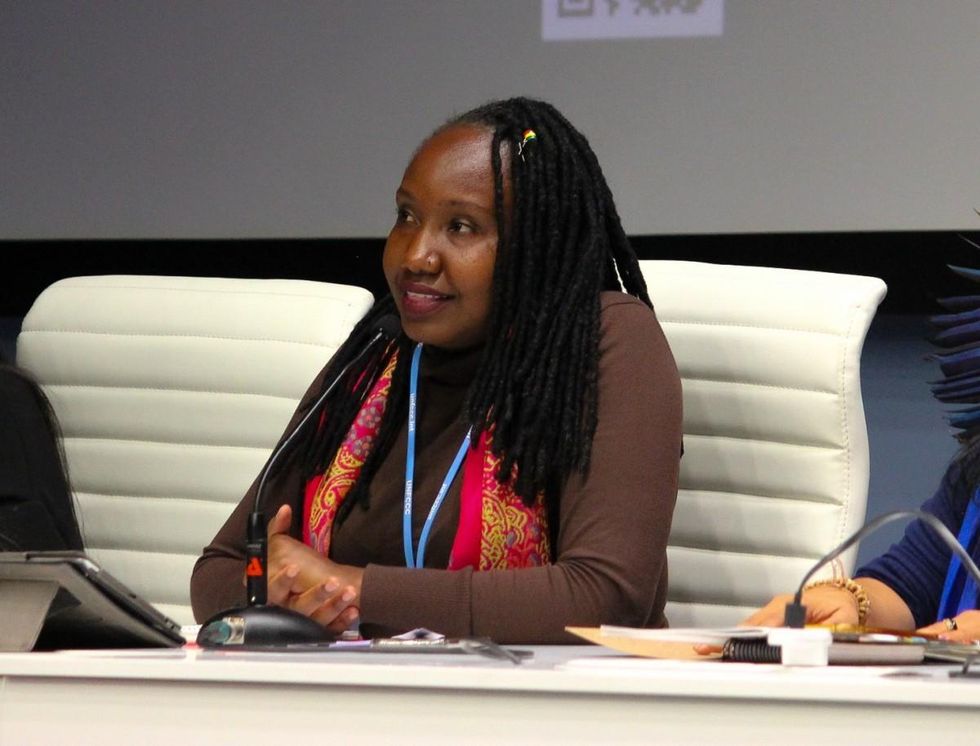
"Even in these difficult times, people are finding ways to resist authoritarianism and an economic system that finds us disposable, the majority of us being women, being queer people, being farmers. ...We have to conceive our work in movements as a deeply political project. This is not the time to say we are neutral, to bring everyone to the big tent. As feminists, women, and environmental defenders, we have to know that our work will be contentious. ...We have to build our movements with the aspirations of those on the margins of pipelines, coal power plants, corporations in their territories, and center the aspirations of those on the frontlines of the crisis we face."
Ruth Nyambura is a Kenyan feminist who works on the intersections of gender, economy, and ecological justice. She is part of the African Ecofeminist Collective and her organizing and research interests are on the agrarian political economy of Africa and the rural-urban movements resisting the corporatization of Africa's food systems.
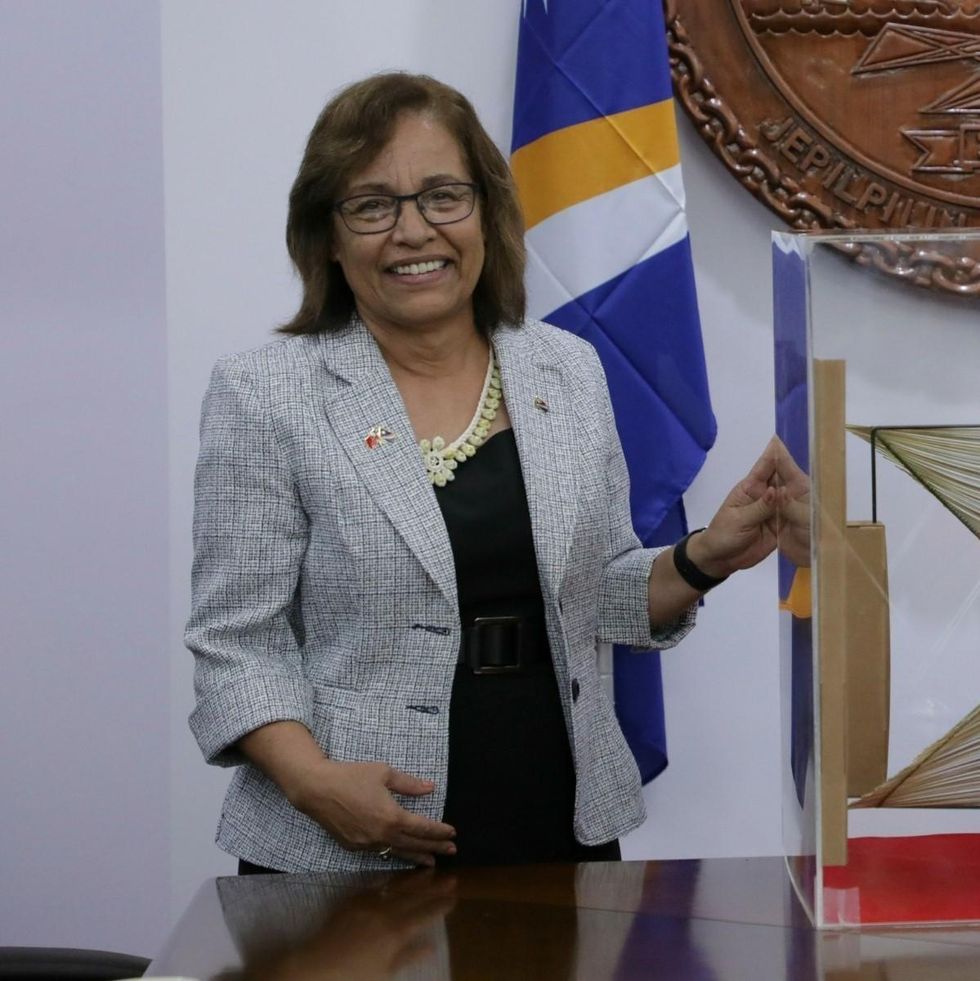
"The crisis is here. There is no time to waste. I think every responsible [leader] must declare their commitments and take those commitments seriously because not doing so is affecting the lives, the very existence of countries, and people and culture, like the Marshall Islands."
Hilda Heine is the former president of the Republic of the Marshall Islands (2016-2020). She is the first individual in the Marshall Islands to earn a doctorate and is the founder of the women's rights group Women United Together Marshall Islands.
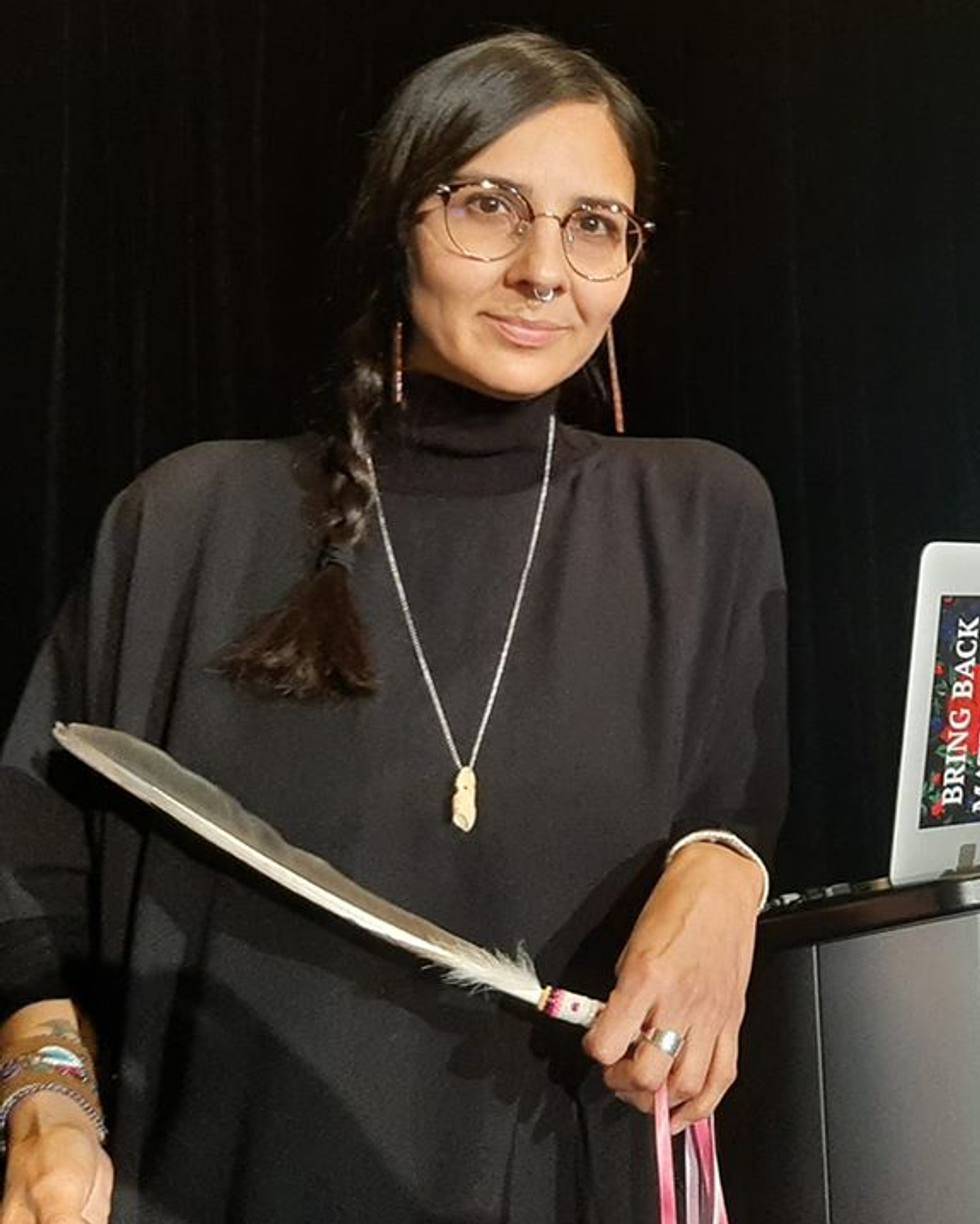
"500 years later and we are still challenging these systems of patriarchy, extractivism, and the ongoing colonization of our territories and yet we still continue to rise. We still continue to stand on the frontlines for the future generations and all the generations to come. Not just for our families and territories but for the winged-ones, the four-legged ones, the ones in the water, the trees and the plants, and the medicines that are intrinsically a part of who we are. We are fighting for all the generations of all people."
Eriel Tchekwie Deranger is a Denesuline woman (ts'ekui), member of the Athabasca Chipewyan First Nation, and mother of two, coming from a family of Indigenous rights advocates fighting for the recognition, sovereignty, and autonomy of their Indigenous lands and territory in what is now known as Treaty 8, Canada. Deranger is the executive director of Indigenous Climate Action, the only Indigenous-led climate justice organization in so-called Canada. Recently, Indigenous Climate Action led a successful campaign which resulted in Teck Resources withdrawing its application for the Frontier project, the largest ever proposed open pit tar sands mine. Learn more about ICA's work here.
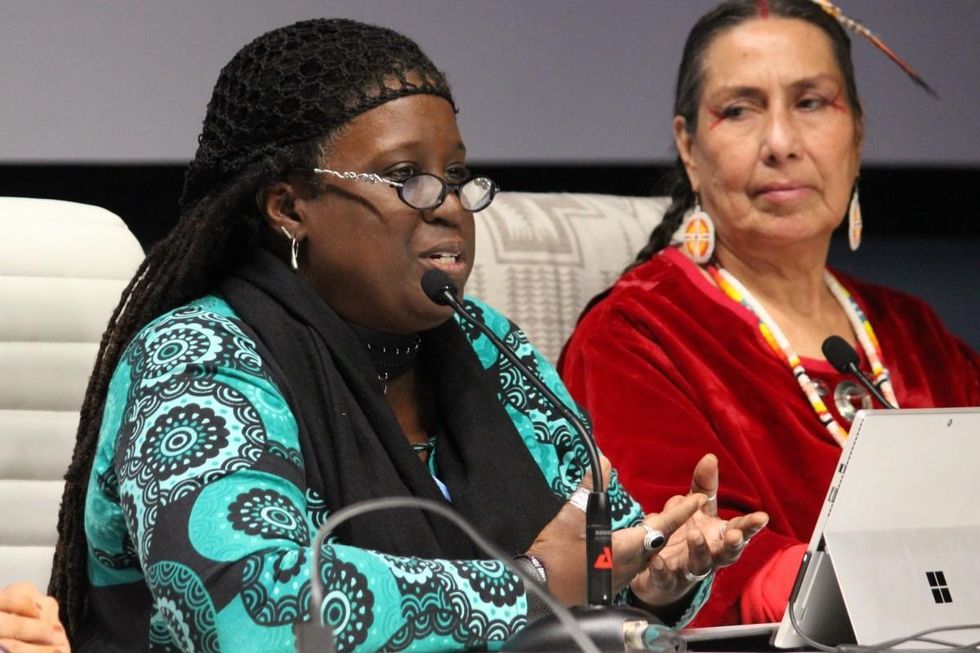
"Through replacing systems rooted in extraction exploitation and domination with principles and practices of regeneration, cooperation, and resilience, communities are rising up, coming together, and practicing Dr. Martin Luther King's vision of revolutionary love. In this uprising, in this principled resistance, in this practice of revolutionary love lies our hope for a fossil free future."
Jacqueline Patterson is the director of the NAACP Environmental and Climate Justice Program. Since 2007 Patterson has served as coordinator and co-founder of Women of Color United. Jacqui Patterson has worked as a researcher, program manager, coordinator, advocate, and activist working on women's rights, violence against women, HIV/AIDS, racial justice, economic justice, and environmental and climate justice.
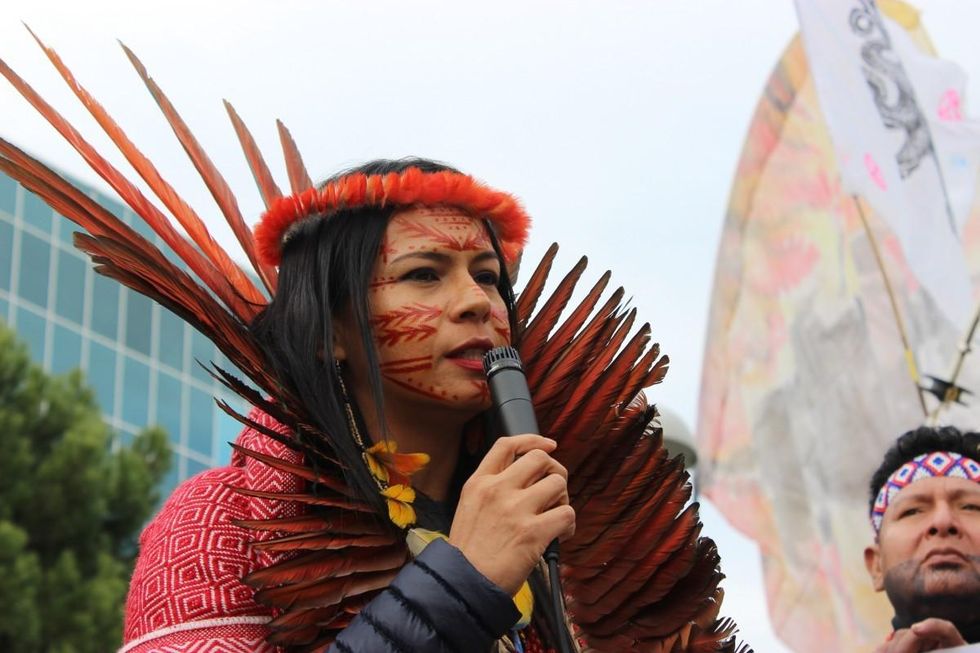
"We are still facing colonization, but we believe that we have rights, we believe that nature has rights, and that is why we defend our Mother, our Earth, our land, our water, our territory with our bodies."
Daiara Tukano is of the Tukano Indigenous people - Ye'pa Mahsa, clan Eremiri Hausiro Parameri of the Alto Rio Negro in the Brazilian Amazon and was born in Sao Paulo. She is an Indigenous activist, artist, and researcher, and an independent communicator and coordinator of Radio Yande, the first indigenous web-radio in Brazil.
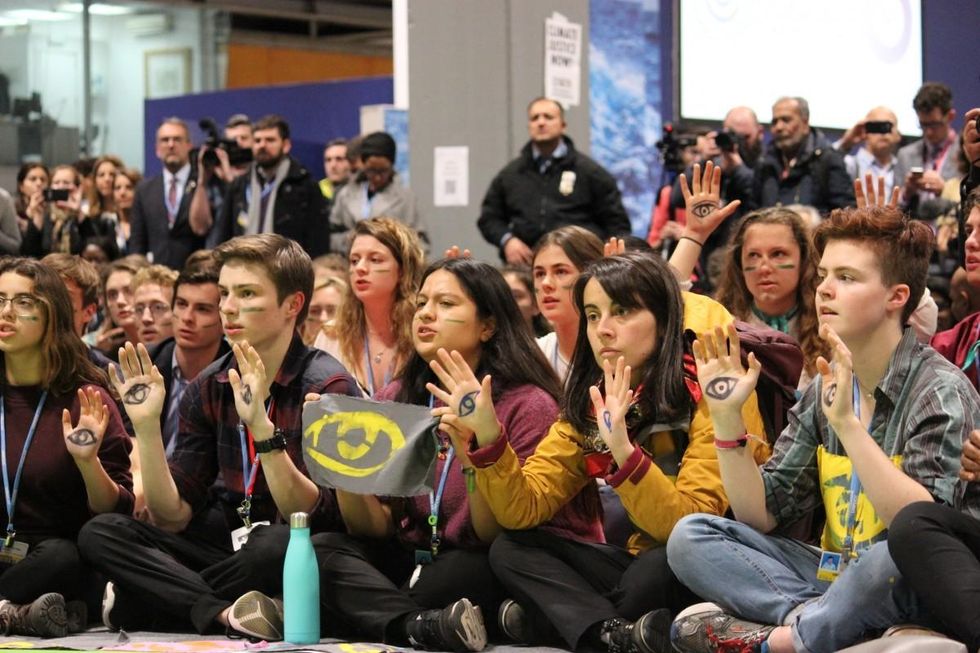
"There is no way we can tackle the climate crisis if we are just thinking of market mechanisms because it's the current economic model that has created the crisis itself... we need to focus, grow, and strengthen our movements especially with solidarity with the Global South because not all countries are protected by democratic systems that listen to its people and in the case of Chile, the world has seen the repression from the state to protestors. We really need to shed light on this and not trust our arms and wait for governments to deliver because they are not, there is a lack of political will, and we the people are the hope for the present and the future."
Angela Valenzuela is a Chilean singer and songwriter, and a coordinator of Fridays for Future in Santiago, Chile.
Dear Common Dreams reader, The U.S. is on a fast track to authoritarianism like nothing I've ever seen. Meanwhile, corporate news outlets are utterly capitulating to Trump, twisting their coverage to avoid drawing his ire while lining up to stuff cash in his pockets. That's why I believe that Common Dreams is doing the best and most consequential reporting that we've ever done. Our small but mighty team is a progressive reporting powerhouse, covering the news every day that the corporate media never will. Our mission has always been simple: To inform. To inspire. And to ignite change for the common good. Now here's the key piece that I want all our readers to understand: None of this would be possible without your financial support. That's not just some fundraising cliche. It's the absolute and literal truth. We don't accept corporate advertising and never will. We don't have a paywall because we don't think people should be blocked from critical news based on their ability to pay. Everything we do is funded by the donations of readers like you. Will you donate now to help power the nonprofit, independent reporting of Common Dreams? Thank you for being a vital member of our community. Together, we can keep independent journalism alive when it’s needed most. - Craig Brown, Co-founder |
As we celebrate the 45th anniversary of International Women's Day, it is essential to now recognize this occasion within the context of a vastly increased environmental and climate crisis. Scientists have confirmed that the pathway to staying below 1.5 degrees Celsius of warming has become urgently narrower. At the same time, many studies demonstrate that a central way to successfully advance climate solutions within this small window is to amplify the leadership and solutions of women--with keen attention to women living on the frontlines of resource extraction and climate disaster.
Women feed our world, pass on traditional ecological knowledge to next generations, and are the backbones of our communities and movements. Women are rising and leading--and importantly--getting results.
Thus, there could not be a more important time to uplift, support, and invest in women's climate justice leadership. Today is a vital moment to emphasize the power and magnitude of women and feminists globally who are speaking out and working ceaselessly to build solutions that protect, defend, and restore the Earth and our communities.
It is also a time to be reminded that due to unequal gender norms, women are impacted first and worst by environmental degradation and climate chaos. Women and children are 14 times more likely than men to die during a disaster, make up 80 percent of climate refugees, and experience sharp increases in sexual violence, human trafficking, and other gender-based abuses when extractive industries overtake and operate in their communities. Globally, women are responsible for over half of the world's household food production, which also means that when natural disasters strike women have to work longer and travel further to produce food and water for their families and communities.
Yet, in the midst of multi-layered injustices including institutionalized patriarchy, colonization, racism, and economic inequality, women continually lead the way from forest protection to transformative and bold climate policies, from water and food programs to resistance efforts against extractive industries. Women feed our world, pass on traditional ecological knowledge to next generations, and are the backbones of our communities and movements. Women are rising and leading--and importantly--getting results.
2020 is the beginning of a new era, one in which we must determine an immediate path forward to radically address climate change. Already this year we can see how decades of organizing are coming to a head, reminding us what we must fight for in the face of humanity's greatest socio-ecological crisis. We have been brought to this moment in great part due to women-led, youth-led, BIPOC-led organizations and groups who have been engaged in this work for decades and generations, who have offered a roadmap for effective strategies, climate justice policies, non-violent civil disobedience, mass mobilizations, and more. The time is now to put all that has been learned into action, to utilize every skill and tactic to fully address the climate crisis and amplify community-led solutions.
On March 8th, the Women's Earth and Climate Action Network (WECAN) International is honoring the roots of International Women's Day, which is founded on the courage of powerful women and feminists leading revolutions that ensure our rights are upheld, our lands are protected, and our bodies are respected. Women across diverse sectors are collectively calling for climate justice and a feminist response to the climate crisis. On this International Women's Day, WECAN is showcasing the breadth, depth, and strength of women's climate leadership by highlighting outstanding women around the world who are working at the local, national, and international levels to take climate action. Some are well-known, while others are not, yet, each of these women leaders are an example of the millions of women who are leading and acting with fierce dedication to accelerate a global women's movement for the protection and defense of the Earth's diverse ecosystems and our communities.

"Everyone has to play a role to guarantee the lives of the people and protect the environment. Indigenous lands are still the most preserved areas and they contain 80 percent of all the biodiversity that exists, and this protection is guaranteed by our own ways of life. So, if the Indigenous peoples are threatened, all humanity is threatened. If biodiversity is threatened by the politicians regarding mining, agro-business, all humanity is threatened. So we call all the people all over the world, Indigenous, non-Indigenous, children, youth and women to join us in the resistance to denounce all the threats that are happening in Brazil. This fight is not just ours, we cannot handle this responsibility by ourselves. We are all called to be at the frontlines of the resistance."
Sonia Bone Guajajara is the executive coordinator of the Articulation of Indigenous Peoples of Brazil (APIB). She is an Indigenous leader from the Arariboia Indigenous Land of the Guajajara people and was a candidate for vice president of Brazil in the 2018 elections. In 2020, Guajajara will lead an Indigenous women's caravan in Brazil that will support the leadership of Indigenous women throughout the Amazon.

"We are seeing because of climate change 200 to 500 thousand people dying every year. We are living this climate genocide, and we cannot pretend that this is not happening. We have to call it for what it is--it is a climate genocide, and this genocide is fueled by corporate greed and funded by the fossil fuel industry, an industry that has crippled our governments with their money and eradicated our democracies. ...But we are not going to sit by... you are not going to gamble with the lives of our children--we will fight back and we are fighting back, we will do everything we can. Our children will not be climate refugees."
Thilmeeza Hussain is the permanent representative of Maldives to the United Nations and is co-founder of Voice of Women, a Maldivian organization working on issues of women's empowerment, human rights, and climate change.

"We are not here to save nature, we are nature saving itself... We belong to the Earth, she does not belong to us. To enslave her is so ugly, to rape her is the same as violence against us because it is violence against us. If we continue along this path of unravelling the web of life and carelessly burning it in fossil fuels, we will be another species to disappear. What will your legacy be?"
Casey Camp-Horinek of the Ponca Nation is a community leader, longtime Native rights activist, environmentalist, actress, and WECAN International senior advisor. As traditional drumkeeper for the Ponca Pa-tha-ta, Woman's Scalp Dance Society, Camp-Horinek helps maintain the cultural identity of the Ponca Nation of Oklahoma for herself, her family, and her community.

"We have been protecting the world's biodiversity for hundreds of years and we will keep doing that and we are not going to stop; we are not going anywhere. We are going to be here, even if the governments are trying to cover up their criminal activity in our territories... I am here to demand that the oil is kept in the ground [and] we have the human rights we deserve."
Helena Siren Gualinga is an 18-year-old social activist, of Kichwa-Indigenous and Swedish origin. She is known for her advocacy for climate and environmental justice. In 2020, Gualinga is spearheading a campaign called 'Polluters Out' to address the influence of the fossil fuel industry in governments and the United Nations.

"The women of Congo are determined to change things in Itombwe, for ourselves and for the rest of the world. We are taking our forest stewardship seriously. We know that the difference we make not only affects our world, but the rest of our planet. We feel the weight of it all and are doing our part. To our sisters around the world we say: We are together!"
Neema Namadamu is a visionary peacemaker from Bukavu, South Kivu Province in Eastern Democratic Republic of Congo (DRC). Namadamu is founder and director of SAFECO and WECAN International regional coordinator in the DRC where she works to build women's leadership and protect the rich ecosystems of the Itombwe rainforest.

"It has been on the shoulders of Indigenous women to bring our voices forward because we are the ones, as Mother Nature is, who brings life forward, we are the ones who also feel protective towards life, especially for our children and grandchildren into the future and the world that we are leaving behind for them, all of this matters, we are not just here for nothing...We've got to have our voices heard to make a statement and save the Tongass by codifying the 2001 National Roadless Rule into law."
Kashudoha Wanda Culp is an Indigenous Tlingit activist, advocate, and hunter, fisher and gatherer of wild foods, born and raised in Juneau, and living in Hoonah, Alaska. She is the WECAN International Tongass Regional Coordinator and is spearheading initiatives to protect the Tongass rainforest from clear-cut logging and deforestation, and to uplift the traditional rights and lifeways of the regions Indigenous peoples.

"Even in these difficult times, people are finding ways to resist authoritarianism and an economic system that finds us disposable, the majority of us being women, being queer people, being farmers. ...We have to conceive our work in movements as a deeply political project. This is not the time to say we are neutral, to bring everyone to the big tent. As feminists, women, and environmental defenders, we have to know that our work will be contentious. ...We have to build our movements with the aspirations of those on the margins of pipelines, coal power plants, corporations in their territories, and center the aspirations of those on the frontlines of the crisis we face."
Ruth Nyambura is a Kenyan feminist who works on the intersections of gender, economy, and ecological justice. She is part of the African Ecofeminist Collective and her organizing and research interests are on the agrarian political economy of Africa and the rural-urban movements resisting the corporatization of Africa's food systems.

"The crisis is here. There is no time to waste. I think every responsible [leader] must declare their commitments and take those commitments seriously because not doing so is affecting the lives, the very existence of countries, and people and culture, like the Marshall Islands."
Hilda Heine is the former president of the Republic of the Marshall Islands (2016-2020). She is the first individual in the Marshall Islands to earn a doctorate and is the founder of the women's rights group Women United Together Marshall Islands.

"500 years later and we are still challenging these systems of patriarchy, extractivism, and the ongoing colonization of our territories and yet we still continue to rise. We still continue to stand on the frontlines for the future generations and all the generations to come. Not just for our families and territories but for the winged-ones, the four-legged ones, the ones in the water, the trees and the plants, and the medicines that are intrinsically a part of who we are. We are fighting for all the generations of all people."
Eriel Tchekwie Deranger is a Denesuline woman (ts'ekui), member of the Athabasca Chipewyan First Nation, and mother of two, coming from a family of Indigenous rights advocates fighting for the recognition, sovereignty, and autonomy of their Indigenous lands and territory in what is now known as Treaty 8, Canada. Deranger is the executive director of Indigenous Climate Action, the only Indigenous-led climate justice organization in so-called Canada. Recently, Indigenous Climate Action led a successful campaign which resulted in Teck Resources withdrawing its application for the Frontier project, the largest ever proposed open pit tar sands mine. Learn more about ICA's work here.

"Through replacing systems rooted in extraction exploitation and domination with principles and practices of regeneration, cooperation, and resilience, communities are rising up, coming together, and practicing Dr. Martin Luther King's vision of revolutionary love. In this uprising, in this principled resistance, in this practice of revolutionary love lies our hope for a fossil free future."
Jacqueline Patterson is the director of the NAACP Environmental and Climate Justice Program. Since 2007 Patterson has served as coordinator and co-founder of Women of Color United. Jacqui Patterson has worked as a researcher, program manager, coordinator, advocate, and activist working on women's rights, violence against women, HIV/AIDS, racial justice, economic justice, and environmental and climate justice.

"We are still facing colonization, but we believe that we have rights, we believe that nature has rights, and that is why we defend our Mother, our Earth, our land, our water, our territory with our bodies."
Daiara Tukano is of the Tukano Indigenous people - Ye'pa Mahsa, clan Eremiri Hausiro Parameri of the Alto Rio Negro in the Brazilian Amazon and was born in Sao Paulo. She is an Indigenous activist, artist, and researcher, and an independent communicator and coordinator of Radio Yande, the first indigenous web-radio in Brazil.

"There is no way we can tackle the climate crisis if we are just thinking of market mechanisms because it's the current economic model that has created the crisis itself... we need to focus, grow, and strengthen our movements especially with solidarity with the Global South because not all countries are protected by democratic systems that listen to its people and in the case of Chile, the world has seen the repression from the state to protestors. We really need to shed light on this and not trust our arms and wait for governments to deliver because they are not, there is a lack of political will, and we the people are the hope for the present and the future."
Angela Valenzuela is a Chilean singer and songwriter, and a coordinator of Fridays for Future in Santiago, Chile.
As we celebrate the 45th anniversary of International Women's Day, it is essential to now recognize this occasion within the context of a vastly increased environmental and climate crisis. Scientists have confirmed that the pathway to staying below 1.5 degrees Celsius of warming has become urgently narrower. At the same time, many studies demonstrate that a central way to successfully advance climate solutions within this small window is to amplify the leadership and solutions of women--with keen attention to women living on the frontlines of resource extraction and climate disaster.
Women feed our world, pass on traditional ecological knowledge to next generations, and are the backbones of our communities and movements. Women are rising and leading--and importantly--getting results.
Thus, there could not be a more important time to uplift, support, and invest in women's climate justice leadership. Today is a vital moment to emphasize the power and magnitude of women and feminists globally who are speaking out and working ceaselessly to build solutions that protect, defend, and restore the Earth and our communities.
It is also a time to be reminded that due to unequal gender norms, women are impacted first and worst by environmental degradation and climate chaos. Women and children are 14 times more likely than men to die during a disaster, make up 80 percent of climate refugees, and experience sharp increases in sexual violence, human trafficking, and other gender-based abuses when extractive industries overtake and operate in their communities. Globally, women are responsible for over half of the world's household food production, which also means that when natural disasters strike women have to work longer and travel further to produce food and water for their families and communities.
Yet, in the midst of multi-layered injustices including institutionalized patriarchy, colonization, racism, and economic inequality, women continually lead the way from forest protection to transformative and bold climate policies, from water and food programs to resistance efforts against extractive industries. Women feed our world, pass on traditional ecological knowledge to next generations, and are the backbones of our communities and movements. Women are rising and leading--and importantly--getting results.
2020 is the beginning of a new era, one in which we must determine an immediate path forward to radically address climate change. Already this year we can see how decades of organizing are coming to a head, reminding us what we must fight for in the face of humanity's greatest socio-ecological crisis. We have been brought to this moment in great part due to women-led, youth-led, BIPOC-led organizations and groups who have been engaged in this work for decades and generations, who have offered a roadmap for effective strategies, climate justice policies, non-violent civil disobedience, mass mobilizations, and more. The time is now to put all that has been learned into action, to utilize every skill and tactic to fully address the climate crisis and amplify community-led solutions.
On March 8th, the Women's Earth and Climate Action Network (WECAN) International is honoring the roots of International Women's Day, which is founded on the courage of powerful women and feminists leading revolutions that ensure our rights are upheld, our lands are protected, and our bodies are respected. Women across diverse sectors are collectively calling for climate justice and a feminist response to the climate crisis. On this International Women's Day, WECAN is showcasing the breadth, depth, and strength of women's climate leadership by highlighting outstanding women around the world who are working at the local, national, and international levels to take climate action. Some are well-known, while others are not, yet, each of these women leaders are an example of the millions of women who are leading and acting with fierce dedication to accelerate a global women's movement for the protection and defense of the Earth's diverse ecosystems and our communities.

"Everyone has to play a role to guarantee the lives of the people and protect the environment. Indigenous lands are still the most preserved areas and they contain 80 percent of all the biodiversity that exists, and this protection is guaranteed by our own ways of life. So, if the Indigenous peoples are threatened, all humanity is threatened. If biodiversity is threatened by the politicians regarding mining, agro-business, all humanity is threatened. So we call all the people all over the world, Indigenous, non-Indigenous, children, youth and women to join us in the resistance to denounce all the threats that are happening in Brazil. This fight is not just ours, we cannot handle this responsibility by ourselves. We are all called to be at the frontlines of the resistance."
Sonia Bone Guajajara is the executive coordinator of the Articulation of Indigenous Peoples of Brazil (APIB). She is an Indigenous leader from the Arariboia Indigenous Land of the Guajajara people and was a candidate for vice president of Brazil in the 2018 elections. In 2020, Guajajara will lead an Indigenous women's caravan in Brazil that will support the leadership of Indigenous women throughout the Amazon.

"We are seeing because of climate change 200 to 500 thousand people dying every year. We are living this climate genocide, and we cannot pretend that this is not happening. We have to call it for what it is--it is a climate genocide, and this genocide is fueled by corporate greed and funded by the fossil fuel industry, an industry that has crippled our governments with their money and eradicated our democracies. ...But we are not going to sit by... you are not going to gamble with the lives of our children--we will fight back and we are fighting back, we will do everything we can. Our children will not be climate refugees."
Thilmeeza Hussain is the permanent representative of Maldives to the United Nations and is co-founder of Voice of Women, a Maldivian organization working on issues of women's empowerment, human rights, and climate change.

"We are not here to save nature, we are nature saving itself... We belong to the Earth, she does not belong to us. To enslave her is so ugly, to rape her is the same as violence against us because it is violence against us. If we continue along this path of unravelling the web of life and carelessly burning it in fossil fuels, we will be another species to disappear. What will your legacy be?"
Casey Camp-Horinek of the Ponca Nation is a community leader, longtime Native rights activist, environmentalist, actress, and WECAN International senior advisor. As traditional drumkeeper for the Ponca Pa-tha-ta, Woman's Scalp Dance Society, Camp-Horinek helps maintain the cultural identity of the Ponca Nation of Oklahoma for herself, her family, and her community.

"We have been protecting the world's biodiversity for hundreds of years and we will keep doing that and we are not going to stop; we are not going anywhere. We are going to be here, even if the governments are trying to cover up their criminal activity in our territories... I am here to demand that the oil is kept in the ground [and] we have the human rights we deserve."
Helena Siren Gualinga is an 18-year-old social activist, of Kichwa-Indigenous and Swedish origin. She is known for her advocacy for climate and environmental justice. In 2020, Gualinga is spearheading a campaign called 'Polluters Out' to address the influence of the fossil fuel industry in governments and the United Nations.

"The women of Congo are determined to change things in Itombwe, for ourselves and for the rest of the world. We are taking our forest stewardship seriously. We know that the difference we make not only affects our world, but the rest of our planet. We feel the weight of it all and are doing our part. To our sisters around the world we say: We are together!"
Neema Namadamu is a visionary peacemaker from Bukavu, South Kivu Province in Eastern Democratic Republic of Congo (DRC). Namadamu is founder and director of SAFECO and WECAN International regional coordinator in the DRC where she works to build women's leadership and protect the rich ecosystems of the Itombwe rainforest.

"It has been on the shoulders of Indigenous women to bring our voices forward because we are the ones, as Mother Nature is, who brings life forward, we are the ones who also feel protective towards life, especially for our children and grandchildren into the future and the world that we are leaving behind for them, all of this matters, we are not just here for nothing...We've got to have our voices heard to make a statement and save the Tongass by codifying the 2001 National Roadless Rule into law."
Kashudoha Wanda Culp is an Indigenous Tlingit activist, advocate, and hunter, fisher and gatherer of wild foods, born and raised in Juneau, and living in Hoonah, Alaska. She is the WECAN International Tongass Regional Coordinator and is spearheading initiatives to protect the Tongass rainforest from clear-cut logging and deforestation, and to uplift the traditional rights and lifeways of the regions Indigenous peoples.

"Even in these difficult times, people are finding ways to resist authoritarianism and an economic system that finds us disposable, the majority of us being women, being queer people, being farmers. ...We have to conceive our work in movements as a deeply political project. This is not the time to say we are neutral, to bring everyone to the big tent. As feminists, women, and environmental defenders, we have to know that our work will be contentious. ...We have to build our movements with the aspirations of those on the margins of pipelines, coal power plants, corporations in their territories, and center the aspirations of those on the frontlines of the crisis we face."
Ruth Nyambura is a Kenyan feminist who works on the intersections of gender, economy, and ecological justice. She is part of the African Ecofeminist Collective and her organizing and research interests are on the agrarian political economy of Africa and the rural-urban movements resisting the corporatization of Africa's food systems.

"The crisis is here. There is no time to waste. I think every responsible [leader] must declare their commitments and take those commitments seriously because not doing so is affecting the lives, the very existence of countries, and people and culture, like the Marshall Islands."
Hilda Heine is the former president of the Republic of the Marshall Islands (2016-2020). She is the first individual in the Marshall Islands to earn a doctorate and is the founder of the women's rights group Women United Together Marshall Islands.

"500 years later and we are still challenging these systems of patriarchy, extractivism, and the ongoing colonization of our territories and yet we still continue to rise. We still continue to stand on the frontlines for the future generations and all the generations to come. Not just for our families and territories but for the winged-ones, the four-legged ones, the ones in the water, the trees and the plants, and the medicines that are intrinsically a part of who we are. We are fighting for all the generations of all people."
Eriel Tchekwie Deranger is a Denesuline woman (ts'ekui), member of the Athabasca Chipewyan First Nation, and mother of two, coming from a family of Indigenous rights advocates fighting for the recognition, sovereignty, and autonomy of their Indigenous lands and territory in what is now known as Treaty 8, Canada. Deranger is the executive director of Indigenous Climate Action, the only Indigenous-led climate justice organization in so-called Canada. Recently, Indigenous Climate Action led a successful campaign which resulted in Teck Resources withdrawing its application for the Frontier project, the largest ever proposed open pit tar sands mine. Learn more about ICA's work here.

"Through replacing systems rooted in extraction exploitation and domination with principles and practices of regeneration, cooperation, and resilience, communities are rising up, coming together, and practicing Dr. Martin Luther King's vision of revolutionary love. In this uprising, in this principled resistance, in this practice of revolutionary love lies our hope for a fossil free future."
Jacqueline Patterson is the director of the NAACP Environmental and Climate Justice Program. Since 2007 Patterson has served as coordinator and co-founder of Women of Color United. Jacqui Patterson has worked as a researcher, program manager, coordinator, advocate, and activist working on women's rights, violence against women, HIV/AIDS, racial justice, economic justice, and environmental and climate justice.

"We are still facing colonization, but we believe that we have rights, we believe that nature has rights, and that is why we defend our Mother, our Earth, our land, our water, our territory with our bodies."
Daiara Tukano is of the Tukano Indigenous people - Ye'pa Mahsa, clan Eremiri Hausiro Parameri of the Alto Rio Negro in the Brazilian Amazon and was born in Sao Paulo. She is an Indigenous activist, artist, and researcher, and an independent communicator and coordinator of Radio Yande, the first indigenous web-radio in Brazil.

"There is no way we can tackle the climate crisis if we are just thinking of market mechanisms because it's the current economic model that has created the crisis itself... we need to focus, grow, and strengthen our movements especially with solidarity with the Global South because not all countries are protected by democratic systems that listen to its people and in the case of Chile, the world has seen the repression from the state to protestors. We really need to shed light on this and not trust our arms and wait for governments to deliver because they are not, there is a lack of political will, and we the people are the hope for the present and the future."
Angela Valenzuela is a Chilean singer and songwriter, and a coordinator of Fridays for Future in Santiago, Chile.